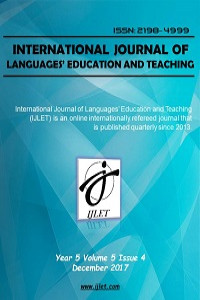The Effect of Project Based Learning in Teaching EFL Vocabulary to Young Learners of English: The Case of Pre-school Children
Abstract
English language teaching has newly been introduced to pre-school curriculum in Turkey. The purpose of this study was to investigate the effectiveness of teaching EFL vocabulary to pre-school children through Project Based Learning (PBL). For this purpose, an experimental design, consisted of observation checklists, exam scores and a short survey, was adopted. Firstly, through a short online survey, 150 kindergarten teachers were asked to specify which techniques they commonly used in their English classes. The primary aim here was to define traditional techniques and the rate of PBL use in Turkey. After defining common techniques, 28 children were randomly assigned to experimental (PBL instruction) and control groups (traditional instruction) equally and the data was collected in real time classroom setting for 8 weeks. The results showed that (1) PBL was rarely adopted in EFL classes in Turkey, (2) PBL instruction could increase EFL vocabulary learning gains when compared to common methods and (3) young learners were observed to have been more active in PBL classes. The effect of PBL instruction was discussed in local, cognitive and motivational perspectives in the light of previous related research. The potential benefits of further PBL use for young EFL learners and implications were also discussed.
References
- Anşin, S. (2006). Çocuklarda yabancı dil öğretimi. Dicle Üniversitesi Ziya Gökalp Eğitim Fakültesi Dergisi, 6, 9-20.
- Arca, D. (2013). Action Research on Multiple Intelligences Based Instruction in Preschool Foreign Language Classes. Master’s thesis. Middle East technical University, Ankara.
- Baş, G. & Beyhan, Ö. (2010). Effects of multiple intelligences supported project-based learning on students’ achievement levels and attitudes towards English lesson. International Electronic Journal of Elementary Education Vol. 2, Issue 3.
- Benson, P., & Voller, P. (Eds.) (1997). Autonomy and independence in language learning. London: Longman.
- Beres, P. J. (2011). project- based learning and its effect on motivation ın the adolescent mathematics classroom. Education and Human Development Master's Theses. Paper 39.
- Bezcioğlu Göktolga, İ. (2013). Self-reports of preschool foreign language teachers onearly childhood foreign language teaching and related challenges. The degree of master of science, Middle East Technical University, Ankara, Turkey.
- Birdsong, D. (Ed.). (1999). Second language acquisition and the critical period hypothesis. Routledge.
- Blumenfeld, P. C., Soloway, E., Marx, R. W., Krajcik, J. S., Guzdial, M., & Palincsar, A. (1991). Motivating project-based learning: Sustaining the doing, supporting the learning. Educational psychologist, 26(3-4), 369-398.
- Brunetti, A. J., & Petrell, R. J., & Sawada, B. (2003). Team project-based learning enhances awareness of sustainability at the University of British Columbia, Canada. International Journal of Sustainability in Higher Education, 4, 210.
The Effect of Project Based Learning in Teaching EFL Vocabulary to Young Learners of English: The Case of Pre-school Children
Abstract
References
- Anşin, S. (2006). Çocuklarda yabancı dil öğretimi. Dicle Üniversitesi Ziya Gökalp Eğitim Fakültesi Dergisi, 6, 9-20.
- Arca, D. (2013). Action Research on Multiple Intelligences Based Instruction in Preschool Foreign Language Classes. Master’s thesis. Middle East technical University, Ankara.
- Baş, G. & Beyhan, Ö. (2010). Effects of multiple intelligences supported project-based learning on students’ achievement levels and attitudes towards English lesson. International Electronic Journal of Elementary Education Vol. 2, Issue 3.
- Benson, P., & Voller, P. (Eds.) (1997). Autonomy and independence in language learning. London: Longman.
- Beres, P. J. (2011). project- based learning and its effect on motivation ın the adolescent mathematics classroom. Education and Human Development Master's Theses. Paper 39.
- Bezcioğlu Göktolga, İ. (2013). Self-reports of preschool foreign language teachers onearly childhood foreign language teaching and related challenges. The degree of master of science, Middle East Technical University, Ankara, Turkey.
- Birdsong, D. (Ed.). (1999). Second language acquisition and the critical period hypothesis. Routledge.
- Blumenfeld, P. C., Soloway, E., Marx, R. W., Krajcik, J. S., Guzdial, M., & Palincsar, A. (1991). Motivating project-based learning: Sustaining the doing, supporting the learning. Educational psychologist, 26(3-4), 369-398.
- Brunetti, A. J., & Petrell, R. J., & Sawada, B. (2003). Team project-based learning enhances awareness of sustainability at the University of British Columbia, Canada. International Journal of Sustainability in Higher Education, 4, 210.
Details
| Primary Language | English |
|---|---|
| Subjects | English As A Second Language, Language Studies (Other), Applied Linguistics and Educational Linguistics |
| Journal Section | Research Article |
| Authors | |
| Publication Date | December 30, 2017 |
| Published in Issue | Year 2017 Volume: 5 Issue: 4 |


